Last year, we said there was no better measurement of success after being listed among the fastest growing companies; we were wrong. ebs Associates was named as one of the fastest growing companies again, making the Inc. 5000 List for the second time in a row.
Talk to An Advisor Today
You might also like these articles

Year End Accounting Checklist: How To Close the Fiscal Year Year end is here, and it’s time to get your QuickBooks year end accounting checklist ready! While it may seem like it came out of nowhere, it’s important to be prepared. Many businesses find themselves overwhelmed with financial tasks and time management when closing the…

As businesses grow and evolve, their needs change. One ongoing challenging decision is selecting the right accounting system. Numerous factors come into play, including readiness for upgrades or switches, and determining the most suitable configuration for your industry. To help you decide what would be the best fit for your business, we will be comparing…

In a dynamic business landscape where only the most adaptable thrive, our journey over the past year has been nothing short of spectacular. Charting a trajectory marked by strategic acquisitions and fueled by relentless dedication, Out of the Box Technology has not only expanded its footprint but also proudly clinched a coveted spot on the…
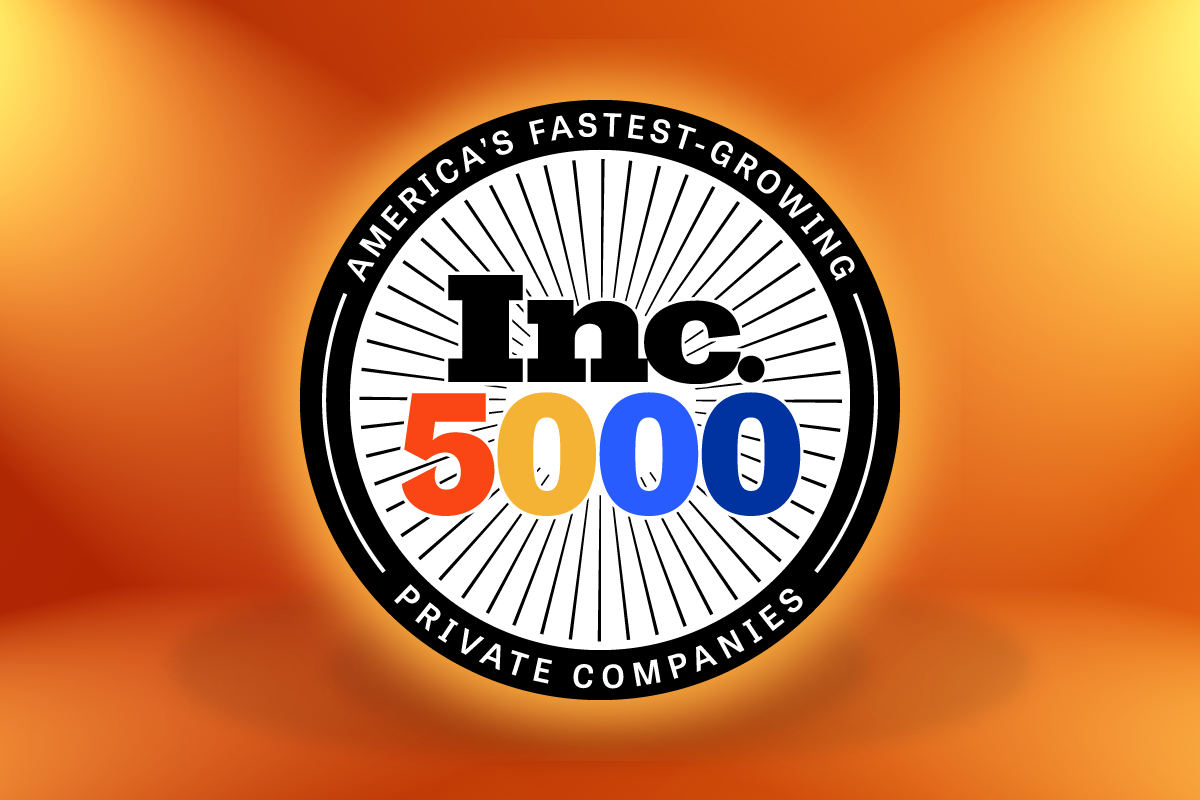
For the 5th time, we are excited to share the news that Out Of The Box Technology has made the Inc. 5000 list this year! This award recognizes the fastest-growing companies in America, many of which have grown six-fold since 2016 alone. Not only have the companies on the 2021 Inc. 5000 been very competitive within their markets, but…
Claim your complimentary bookeeping assesment today
April 15, 2024
Choose QuickBooks Enterprise or Advanced

We recommend QuickBooks because we:
- Know its vast array of functional capabilities, and
- Understand its high flexibility in accommodating wide ranges of varying solution configurations.
This allows us to design a custom-tailored solution to meet and exceed your business needs.
Talk to An Advisor Today
You might also like these articles
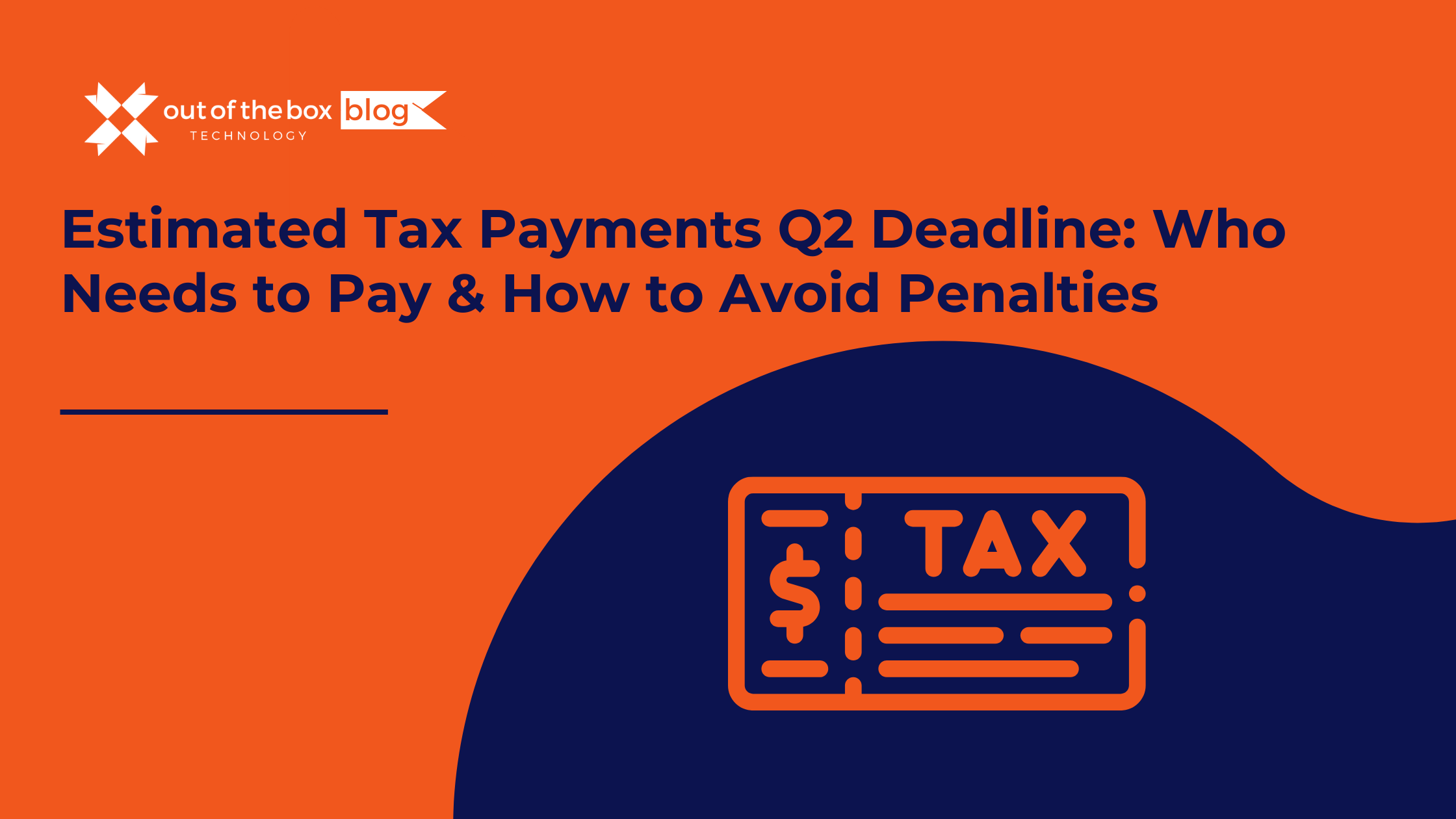
For self-employed individuals, freelancers, gig workers, and small business owners, paying taxes isn’t just a once-a-year event. If you expect to owe $1,000 or more in federal taxes, the IRS likely expects you to pay estimated tax payments each quarter — and the Q2 estimated tax deadline is June 15. In this guide, we’ll explain…
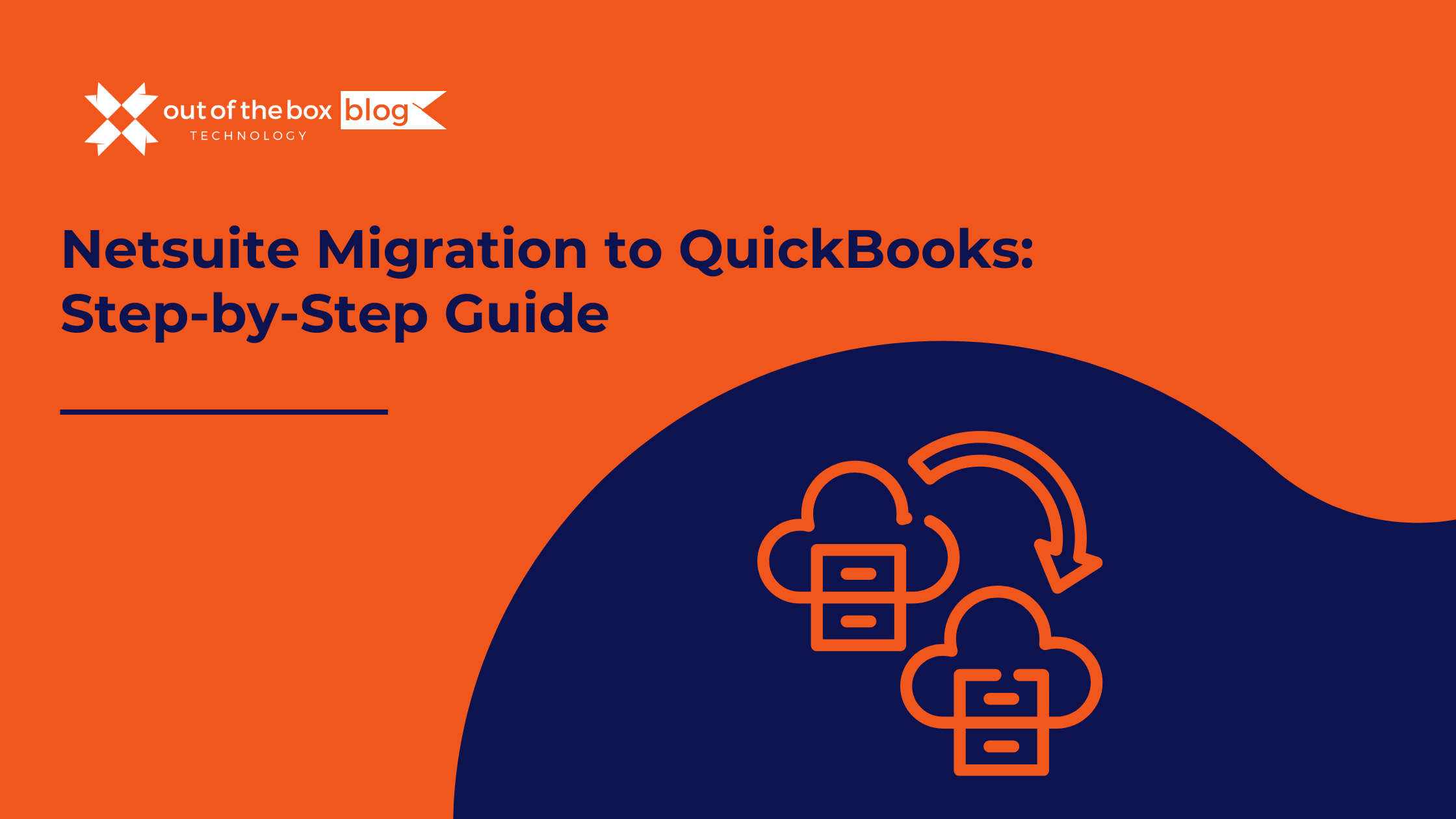
If your business is considering a move from Oracle NetSuite to QuickBooks, you’re not alone. While NetSuite is a powerful ERP platform, many growing businesses eventually find that it may be more complex—and costly—than they need. Whether you’re downsizing, simplifying your accounting systems, or seeking a more cost-effective solution, a NetSuite migration to QuickBooks can…
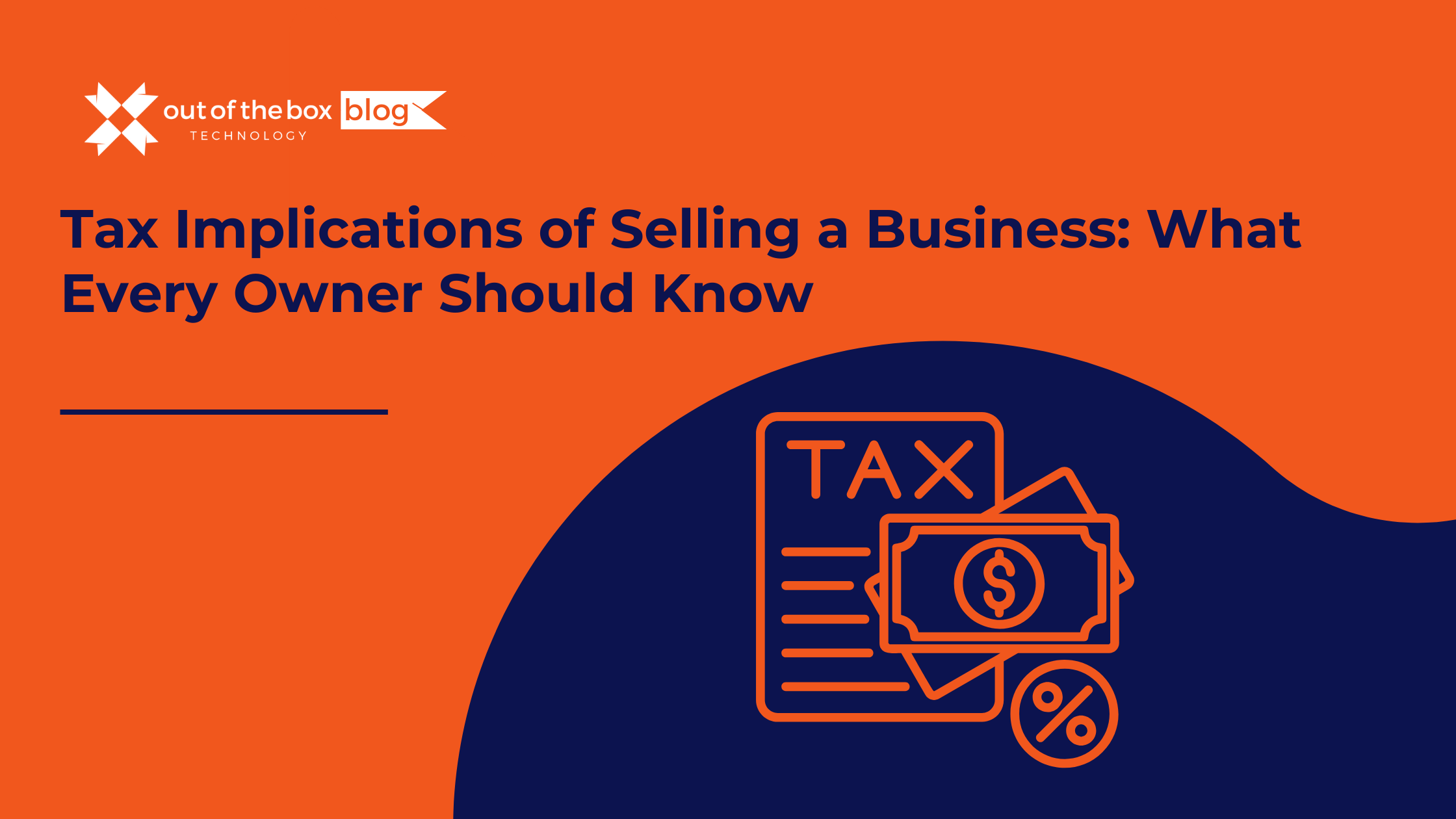
Selling a business can be one of the most profitable — and complex — decisions a small business owner makes. But before you celebrate a big payday, it’s essential to understand the tax implications of selling a business. From capital gains taxes to depreciation recapture and how goodwill is treated, the way your sale is…
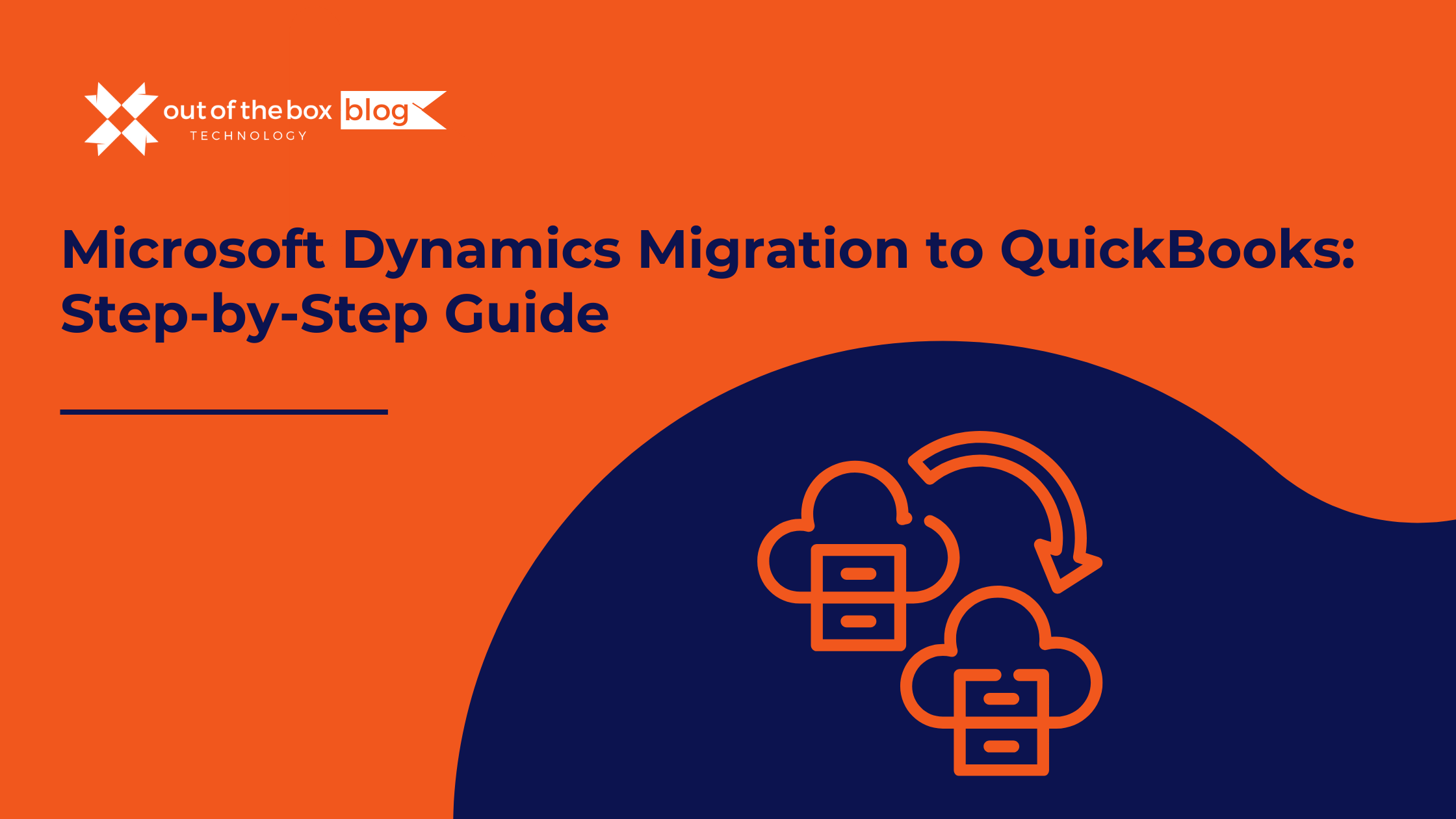
For many growing businesses, Microsoft Dynamics (including Dynamics GP, NAV, or Business Central) offers robust ERP features. But as your organization evolves, you may find that the platform becomes too complex or costly for your current needs. That’s when a Microsoft Dynamics migration to QuickBooks becomes an attractive option. In this guide, we’ll explore when…
Claim your complimentary bookeeping assesment today
May 07, 2025
Tax Implications of Selling a Business: What Every Owner Should Know

Selling a business can be one of the most profitable — and complex — decisions a small business owner makes. But before you celebrate a big payday, it’s essential to understand the tax implications of selling a business. From capital gains taxes to depreciation recapture and how goodwill is treated, the way your sale is structured can significantly impact how much you keep after the IRS takes its share.
If you’re planning to sell your business in the next 1–3 years, now is the time to start tax planning. In this guide, we’ll break down the most critical tax factors that can influence your net proceeds, with examples and actionable tips.
Asset Sale vs. Stock Sale: Why Structure Matters
One of the first and most important distinctions in a business sale is whether it’s an asset sale or a stock sale. Each structure has different tax consequences for both buyers and sellers.
What is an Asset Sale?
In an asset sale, the buyer purchases individual business assets — such as equipment, customer lists, inventory, and intellectual property. The business entity itself (like the corporation or LLC) remains with the seller.
Tax implications for the seller:
-
Gains from each asset are taxed separately.
-
Depreciable assets may trigger depreciation recapture, taxed as ordinary income.
-
Goodwill and other intangibles are taxed as long-term capital gains.
Buyer preference: Buyers usually prefer asset sales because they can “step up” the basis of the assets and get future depreciation deductions.
What is a Stock Sale?
In a stock sale, the buyer purchases the ownership shares of the business entity. This is more common when selling a corporation.
Tax implications for the seller:
-
Entire gain is generally taxed at long-term capital gains rates (typically 15–20% federally).
-
No depreciation recapture.
Seller preference: Sellers prefer stock sales for their tax simplicity and lower overall tax rate.
Example:
Let’s say you’re selling your plumbing business for $2 million.
-
In an asset sale, $1.2M of that is allocated to equipment and inventory (subject to depreciation recapture), while $800K is goodwill (capital gains).
-
In a stock sale, the full $2 million is taxed at capital gains rates.
The structure alone could mean a difference of tens or even hundreds of thousands of dollars in after-tax proceeds.
Capital Gains vs. Ordinary Income
Understanding the difference between capital gains and ordinary income is central to business sale tax planning.
Capital Gains
-
Long-term capital gains (assets held >1 year) are taxed at 15%–20% federally.
-
Applies to most intangible assets like goodwill, trademarks, and stock.
Ordinary Income
-
Applies to depreciation recapture, inventory, and other “hot assets.”
-
Taxed at your marginal tax rate — which could be up to 37%.
Depreciation Recapture Example
If you sell equipment originally worth $100,000 that’s been fully depreciated, the $100,000 is considered recaptured depreciation and taxed as ordinary income — not capital gains.
That’s a big difference in tax rate: 37% vs. 20%.
How Goodwill is Treated in a Sale
Goodwill represents the intangible value of your business — your brand, customer relationships, and reputation. It’s often the largest portion of the deal in a small business sale.
Tax Treatment:
-
For sellers: Goodwill is a capital asset, so it’s taxed at long-term capital gains rates.
-
For buyers: It’s amortized over 15 years for tax purposes.
Example:
If $500,000 of your $1.5 million sale price is allocated to goodwill, that portion will be taxed at the lower capital gains rate, saving you significantly over time.
Installment Sales: Spreading Out the Tax
Rather than receiving the full sale price upfront, some business owners opt for installment sales, where payments are received over time.
Benefits:
-
Spreads tax liability over multiple years.
-
Keeps seller in a favorable tax bracket annually.
Risks:
-
Buyer defaults.
-
Tax rates increase in future years.
Example:
If you sell your business for $900,000 over 3 years, you only pay capital gains tax on each year’s received installment — potentially keeping you in a lower bracket than taking $900,000 all at once.
Tax Timing: Year-End and Other Considerations
The timing of your sale can affect your taxes significantly.
-
Selling in December could push you into a higher bracket.
-
Closing in January delays tax liability by a full year.
You can also benefit from certain year-end strategies like:
-
Accelerating deductions
-
Deferring income
-
Harvesting capital losses
Proactive Tax Planning Strategies
Tax planning well before the sale — ideally 1–3 years in advance — can help maximize your after-tax proceeds. Here are several strategies to consider:
1. Qualify for Section 1202 (QSBS Exemption)
If your business is a C-corp and meets certain requirements, you may be able to exclude up to 100% of capital gains (up to $10 million) under Qualified Small Business Stock (QSBS).
2. Use a Charitable Remainder Trust (CRT)
Reduce taxes and support a cause by donating shares to a trust before the sale, avoiding immediate capital gains tax.
3. Optimize Entity Structure
Revisit your business entity. S-corps, C-corps, and LLCs are all taxed differently when selling.
4. Consult a Tax Advisor
Work with a CPA or tax attorney who has experience in M&A and exit planning.
Don’t Forget State Taxes and Other Surprises
State Taxes:
Some states — like California and New York — have high capital gains tax rates in addition to federal taxes.
Other considerations:
-
Net Investment Income Tax (NIIT): 3.8% surtax may apply if your income exceeds $250K (married filing jointly).
-
Alternative Minimum Tax (AMT): Rare, but can apply in complex deals.
-
Self-employment tax: If you continue working in the business after the sale.
Summary: Early Planning = More Money in Your Pocket
Selling your business is a major milestone, but poor tax planning can eat into your profits. Key takeaways include:
-
Understand your deal structure — stock vs. asset sale has a huge tax impact.
-
Know how each portion of the sale is taxed — capital gains vs. ordinary income.
-
Use timing and installment strategies to manage when and how you pay taxes.
-
Start planning 1–3 years before your sale with the help of a qualified advisor.
FAQs: Tax Implications of Selling a Business
1. Do I pay capital gains tax when selling my business?
Yes — typically on the sale of goodwill, stock, and other capital assets. Parts of the sale may also be taxed as ordinary income (e.g., equipment, inventory).
2. What’s the difference between an asset sale and a stock sale?
An asset sale involves selling individual assets; a stock sale transfers ownership of the entire business entity. They are taxed differently.
3. How does depreciation recapture work?
It taxes previously deducted depreciation as ordinary income instead of capital gains — often at a higher rate.
4. Can I defer taxes by doing an installment sale?
Yes — you pay taxes as you receive payments over time, which can help manage tax brackets.
5. What happens if I sell to a family member?
The IRS may scrutinize the deal for “related-party” transactions. You still owe taxes, and special rules may apply to valuation and deductions.
6. Can I avoid taxes by rolling the money into another business?
No, unlike real estate 1031 exchanges, there’s no like-kind exchange for business sales under current IRS rules.
7. Should I sell my business at year-end or wait?
Selling at year-end might push you into a higher tax bracket. Selling in January may delay the tax liability and create planning opportunities.
Conclusion: Plan Ahead to Maximize Your After-Tax Profit
Selling your business isn’t just about finding the right buyer or getting a high valuation — it’s also about what you keep after taxes. The structure of the sale, how assets are allocated, and the timing of the transaction all play major roles in your final financial outcome.
Whether you’re a few months or a few years away from an exit, understanding the tax implications of selling a business gives you the power to make informed decisions and avoid costly surprises. Working with experienced tax advisors, CPAs, and transaction attorneys will help you navigate complex issues like depreciation recapture, capital gains treatment, and state-level tax exposure.
With proactive planning, you can preserve more of your hard-earned equity and set yourself up for financial success in the next chapter of your life — whether that’s retirement, a new venture, or simply enjoying the rewards of your work.
Ready to Maximize the Value of Your Business Sale?
Don’t leave your hard-earned profits on the table. The right tax strategy can make a six-figure difference in your final payout.
Solutions Group Accounting specializes in helping business owners navigate complex exit planning, minimize tax liabilities, and ensure a smooth transition. Whether you’re months or years away from selling, their team of experienced CPAs and advisors can build a tailored strategy to protect your wealth.
Talk to An Advisor Today
You might also like these articles

For self-employed individuals, freelancers, gig workers, and small business owners, paying taxes isn’t just a once-a-year event. If you expect to owe $1,000 or more in federal taxes, the IRS likely expects you to pay estimated tax payments each quarter — and the Q2 estimated tax deadline is June 15. In this guide, we’ll explain…

If your business is considering a move from Oracle NetSuite to QuickBooks, you’re not alone. While NetSuite is a powerful ERP platform, many growing businesses eventually find that it may be more complex—and costly—than they need. Whether you’re downsizing, simplifying your accounting systems, or seeking a more cost-effective solution, a NetSuite migration to QuickBooks can…

For many growing businesses, Microsoft Dynamics (including Dynamics GP, NAV, or Business Central) offers robust ERP features. But as your organization evolves, you may find that the platform becomes too complex or costly for your current needs. That’s when a Microsoft Dynamics migration to QuickBooks becomes an attractive option. In this guide, we’ll explore when…
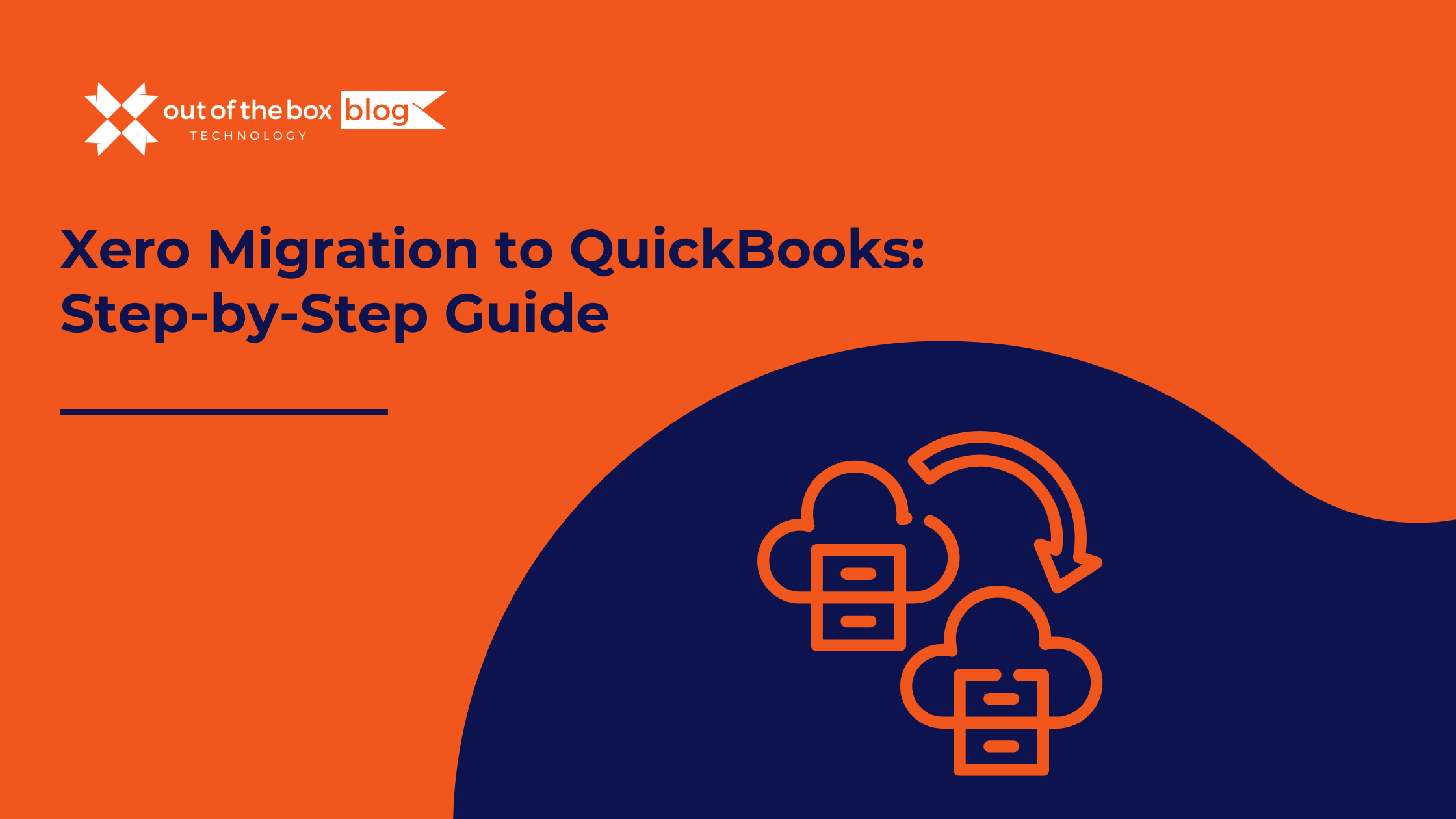
Cloud-based accounting platforms like Xero and QuickBooks Online are popular among small and mid-sized businesses looking for accessible, user-friendly financial tools. But if you’ve outgrown Xero or found it doesn’t meet your evolving needs, a Xero migration to QuickBooks might be your next smart move. Whether it’s due to feature limitations, compatibility with third-party apps,…
Claim your complimentary bookeeping assesment today
May 05, 2025
Xero Migration to QuickBooks: Step-by-Step Guide

Cloud-based accounting platforms like Xero and QuickBooks Online are popular among small and mid-sized businesses looking for accessible, user-friendly financial tools. But if you’ve outgrown Xero or found it doesn’t meet your evolving needs, a Xero migration to QuickBooks might be your next smart move.
Whether it’s due to feature limitations, compatibility with third-party apps, or scalability concerns, many businesses choose to switch. This guide walks you through the key reasons for migrating, the steps to take, what data transfers, and how to ensure your migration is smooth, accurate, and efficient.
Why Businesses Are Switching from Xero to QuickBooks
QuickBooks Online is one of the most widely adopted accounting solutions in North America. Businesses migrating from Xero to QuickBooks often cite these advantages:
1. Broader Integration Ecosystem
QuickBooks integrates with over 750 apps, including Gusto, Stripe, Shopify, HubSpot, and Square. While Xero has many integrations, QuickBooks’ ecosystem is broader and better supported in the U.S.
2. Better Support and Ecosystem in North America
QuickBooks has a larger U.S. support infrastructure, more ProAdvisors, and deeper integration with U.S. tax and banking systems. For U.S.-based businesses, it often provides a smoother experience.
3. Scalability with QuickBooks Online Advanced
QuickBooks Online Advanced supports up to 25 users and includes tools like custom workflows, enhanced reporting, and role-based access—ideal for growing teams.
4. Native Payroll Options
QuickBooks has a fully integrated payroll system. Xero Payroll is not available in many U.S. states, often requiring third-party workarounds.
5. Easier Collaboration with U.S.-Based Accountants
Many CPAs and bookkeepers in the U.S. are certified QuickBooks ProAdvisors, making collaboration, tax prep, and compliance more streamlined.
Who Should Consider a Xero Migration to QuickBooks?
A Xero-to-QuickBooks migration makes the most sense for businesses that:
-
Operate primarily in North America
-
Are scaling and need more advanced features or users
-
Want easier access to U.S.-specific integrations or support
-
Prefer a more familiar platform for their accountants or tax professionals
What Transfers During a Xero Migration to QuickBooks?
Before migrating, it’s critical to understand which data elements transfer automatically and which need manual work.
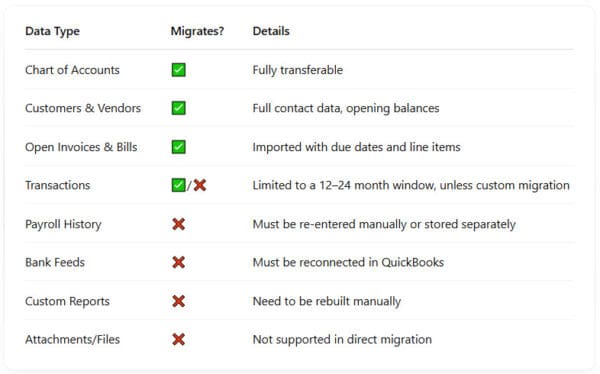
Source: Intuit QuickBooks Data Services, Dataswitcher
Real-World Example
Client: A digital marketing agency with 12 employees
Reason for Migration: Xero lacked payroll support for their state, and their bookkeeper preferred QuickBooks for reporting and 1099 filings.
Solution: Migrated to QuickBooks Online Advanced using Dataswitcher.
Results:
-
Completed migration in 4 business days
-
Rebuilt key reports in QBO with custom tags
-
Cut payroll processing time by 50% with QuickBooks Payroll
Xero vs QuickBooks: Side-by-Side Comparison
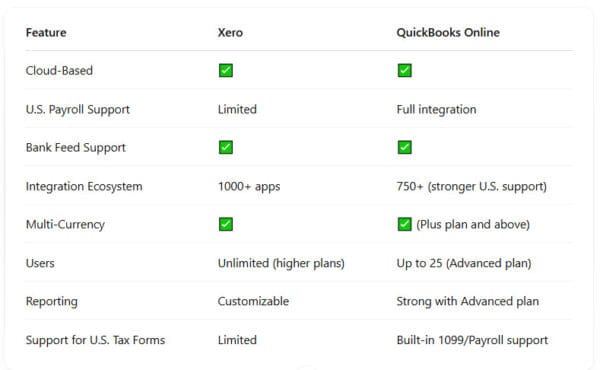
FAQs About Xero Migration to QuickBooks
Q: How long does a Xero migration to QuickBooks take?
A: Small business migrations typically take 2–5 business days. Complex setups or large historical data imports can take 1–2 weeks.
Q: Will I lose my Xero data?
A: No. Your Xero data remains intact. You should download and archive PDFs or CSVs of historical reports before canceling your subscription.
Q: Can I migrate all of my historical transactions?
A: Not natively. QuickBooks typically supports importing 12–24 months of transactions. For full history, use a tool like Dataswitcher.
Q: Can I access Xero after migration?
A: Yes, as long as your subscription is active. Consider downgrading to a lower plan for record access or exporting all key reports.
Q: Do bank feeds transfer from Xero to QuickBooks?
A: No. You’ll need to reconnect your bank accounts and credit cards in QuickBooks.
Final Thoughts
A Xero migration to QuickBooks can streamline your accounting operations, improve payroll management, and align you with the most widely-used accounting system in the U.S. With the right tools and preparation, it can be a smooth, efficient process.
Whether you’re migrating due to functionality, team preferences, or scalability, QuickBooks offers the flexibility and power your business needs to grow with confidence.
Need Help Migrating from Xero to QuickBooks?
We specialize in seamless QuickBooks data migrations—including from Xero, Sage, NetSuite, and Microsoft Dynamics. Our ProAdvisors will guide you from data prep to go-live with zero downtime.
Schedule your free consultation now.
Talk to An Advisor Today
You might also like these articles

For self-employed individuals, freelancers, gig workers, and small business owners, paying taxes isn’t just a once-a-year event. If you expect to owe $1,000 or more in federal taxes, the IRS likely expects you to pay estimated tax payments each quarter — and the Q2 estimated tax deadline is June 15. In this guide, we’ll explain…

If your business is considering a move from Oracle NetSuite to QuickBooks, you’re not alone. While NetSuite is a powerful ERP platform, many growing businesses eventually find that it may be more complex—and costly—than they need. Whether you’re downsizing, simplifying your accounting systems, or seeking a more cost-effective solution, a NetSuite migration to QuickBooks can…

Selling a business can be one of the most profitable — and complex — decisions a small business owner makes. But before you celebrate a big payday, it’s essential to understand the tax implications of selling a business. From capital gains taxes to depreciation recapture and how goodwill is treated, the way your sale is…

For many growing businesses, Microsoft Dynamics (including Dynamics GP, NAV, or Business Central) offers robust ERP features. But as your organization evolves, you may find that the platform becomes too complex or costly for your current needs. That’s when a Microsoft Dynamics migration to QuickBooks becomes an attractive option. In this guide, we’ll explore when…
Claim your complimentary bookeeping assesment today
Talk to An Advisor Today
You might also like these articles

For self-employed individuals, freelancers, gig workers, and small business owners, paying taxes isn’t just a once-a-year event. If you expect to owe $1,000 or more in federal taxes, the IRS likely expects you to pay estimated tax payments each quarter — and the Q2 estimated tax deadline is June 15. In this guide, we’ll explain…

If your business is considering a move from Oracle NetSuite to QuickBooks, you’re not alone. While NetSuite is a powerful ERP platform, many growing businesses eventually find that it may be more complex—and costly—than they need. Whether you’re downsizing, simplifying your accounting systems, or seeking a more cost-effective solution, a NetSuite migration to QuickBooks can…

Selling a business can be one of the most profitable — and complex — decisions a small business owner makes. But before you celebrate a big payday, it’s essential to understand the tax implications of selling a business. From capital gains taxes to depreciation recapture and how goodwill is treated, the way your sale is…

For many growing businesses, Microsoft Dynamics (including Dynamics GP, NAV, or Business Central) offers robust ERP features. But as your organization evolves, you may find that the platform becomes too complex or costly for your current needs. That’s when a Microsoft Dynamics migration to QuickBooks becomes an attractive option. In this guide, we’ll explore when…
